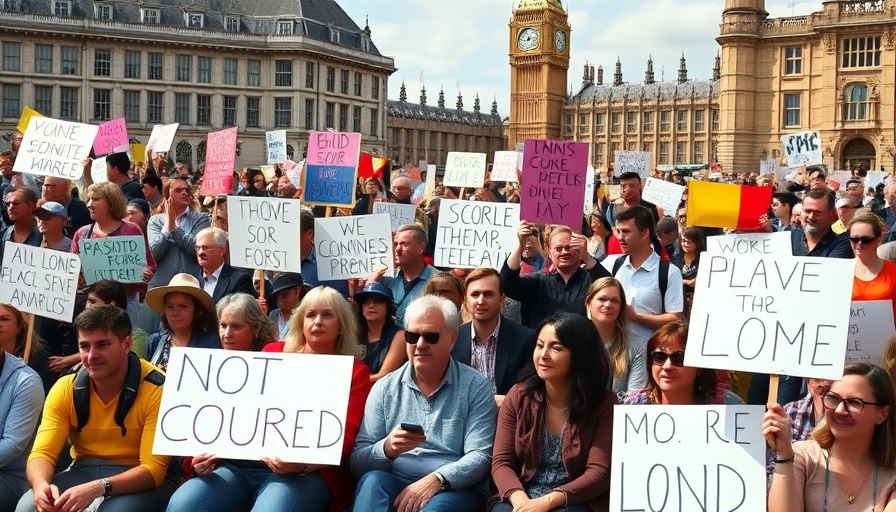
The recent decision by the British government to ban the pro-Palestinian group Palestine Action has stirred up significant controversy and debate. While officials have labeled the group as a terrorist organization under a long-standing antiterrorism law, the details uncovered in a secret intelligence report suggest that this designation may be misplaced.
Understanding the Controversial Ban on Palestine Action
Palestine Action has made headlines for its confrontational approach to activism, which includes vandalizing factories connected to arms production. The British security minister, Dan Jarvis, claimed that an escalation in activities by the group justified the ban, labeling the disruption of public order and safety as serious threats. He warned that the group's actions may not be known to the general public and underscored a willingness to resort to violence to achieve their objectives.
The Intelligence Report: A Different Perspective
However, the intelligence assessment that the government referenced to support its decision presents a narrative that diverges significantly from official claims. The declassified document, acquired by The New York Times, pointed out that "a majority of the group’s activity would not be classified as terrorism" under the legal guidelines in Britain.
This finding raises critical questions about how the term 'terrorism' is applied and whether Palestine Action's methods warrant such a severe classification. The report further indicates that the group’s objectives do not align with the violent means typically associated with organizations commonly labeled as terrorists, such as Al Qaeda and ISIS.
Public Reaction and Legal Implications
The ban has incited considerable protest, leading to hundreds of arrests as supporters rallied against the criminalization of public expressions of support for Palestine Action. Such actions, including protests advocating for the lifting of the ban, challenge long-standing norms of free expression in the UK, a country that typically upholds the right to protest as a fundamental democratic principle.
Activists and legal experts have criticized the government's approach, suggesting that the blanket categorization may dissuade legitimate political discourse regarding Palestinian rights and activism. The implications of this ruling could reverberate throughout the country, affecting how similar groups engage in protest and advocacy.
Exploring the Balance Between Security and Freedom
The clash between national security and civil liberties is not a new one; however, the nuanced context surrounding Palestine Action's activities complicates this debate. Are we witnessing a shift in how governments label dissenting views as terrorism? The intelligence report’s findings undercut claims that the group incites violence against individuals, suggesting that caution should be exercised in labeling politically motivated action as synonymous with terrorism.
Future Perspectives: What Lies Ahead?
As the narrative unfolds, it is vital for citizens to be aware of the implications of such government actions on the landscape of political activism. The legal definitions of terrorism may evolve based on how the public and the courts respond to these classifications. Moreover, this situation illustrates the potential for greater scrutiny of group activities and how they are interpreted by authorities.
In the realm of social justice and human rights activism, it’s important to explore a variety of methods for protest—especially those that uphold the principles of non-violence. Understanding how laws can impact activism is crucial for anyone interested in advocacy, whether for Palestine Action or any cause.
Practical Implications for Activists and Citizens
For activists, this scenario serves as a lesson in the importance of awareness surrounding the legal ramifications of their actions. Engaging in peaceful protest and being informed about legal protections is vital in mitigating risks associated with activism. For the citizenry, understanding the broader implications of government designations can inform public discourse and promote dialogue about freedom of expression.
Final Thoughts on the Future of Activism
The ongoing debate about the classification of Palestine Action as a terrorist organization illuminates the complexities of political movements within a legal framework. It challenges citizens to reflect on how advocacy should be conducted in a democratic society while considering state responses to activism.
In summary, it is essential for both supporters and detractors to engage critically with information concerning political groups. This engagement influences how society navigates the delicate balance of preserving security while ensuring that freedoms of speech and protest are upheld. As this situation continues to evolve, it’s key for everyone involved to stay informed and proactive.
 Add Row
Add Row  Add
Add 




Write A Comment